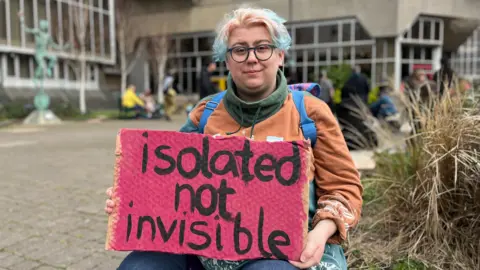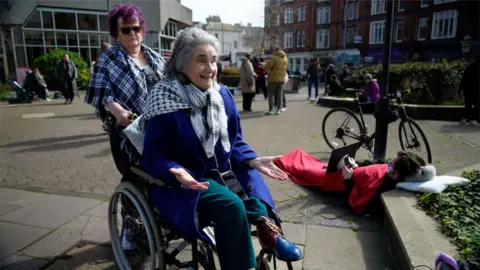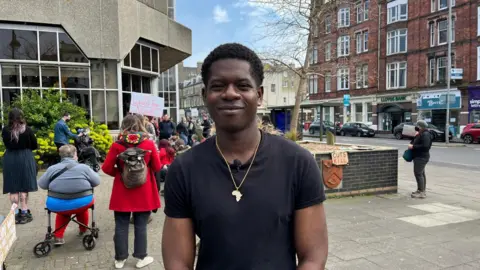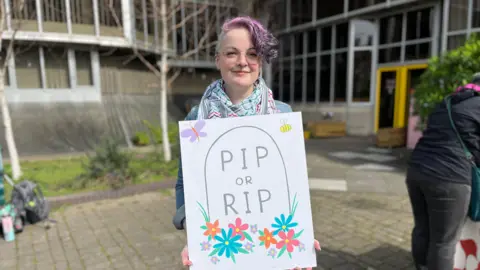'It feels like my life isn't worth paying for'
 BBC
BBCAs Chancellor Rachel Reeves delivered her Spring Statement announcing changes to health-related benefits and universal credit, the Brighton & Hove Crips Against Cuts group held a demonstration in Hove to oppose plans to cut health-related benefit payments.
Work and Pensions Secretary Liz Kendall said the overhaul would create a more "pro-work system" to encourage people to take up jobs, while protecting those who cannot work.
Eliph Hadert, 29, from Brighton, has long-term health conditions, autism and impaired mobility.
Alongside paid work and volunteering, she receives the Personal Independence Payment (PIP) which she used for living expenses, but also allowed her to buy her own wheelchair.
'PIP is such a lifeline'
She said she used the payment "to survive" and that she worked but couldn't do many hours because it made her "so ill".
"I need PIP for food, electricity and washing clothes. It's such a lifeline and it's the way into a lot of other help, like having a disabled bus pass," she said.
"There seems to be some rhetoric that people in the receipt of PIP are benefit scroungers when actually all the people I know on PIP, including myself, work very hard, in paid work or in voluntary work, which I think is just as deserving to be called work."
Ms Hadert said she thought the government was "reinforcing the perception of disabled people as benefit scroungers".
"I've received a lot of abuse on buses and trains when I've asked if I could sit down," she said.
"Someone said to me once 'I've been at work all day, my legs are tired. You've been been sitting on your arse all day. Why should I give you my seat?' And I was coming home from work, I have a job.
"It can just feel awful living in this world. A lot of people that I know that are on PIP are worried and anxious and scared."
She said the changes would "hurt people" and "cause a crisis", adding, "It's going to reduce my ability to go out and afford to live."
"It feels like it affects the value of my life, like my life isn't worth paying for," she added.

Merry Cross, 74, from Shoreham-by-Sea, is a retired social care inspector. She has claimed Disability Living Allowance for many years which has allowed her to buy a car for a carer to drive her around.
She said that "allowed her to be a professional, it allowed me to go to university".
She added: "It allowed me to learn to be a teacher, to work as a teacher and to be a psychologist and then to train people all over the country on protecting disabled children from abuse.
"I couldn't do it by train. I couldn't do it even when I tried with a personal assistant to help me, it was a nightmare. So benefits help people get work and stay in work and put money into the economy."

Kewku Martin-Peprah, 27 and from Hove, is a law graduate but is currently working part-time as a security guard on a zero-hours contract.
He receives universal credit to top up his income and help to pay for his rent.
He said that Gen Z had been "neglected" and young people's mental health "deteriorating" since the pandemic.
"People haven't acknowledged it in any way whatsoever," he said.
"Most of us didn't get to transition into work in the way that the old generations got to transition. We didn't get that process.
"So that's part of the reason why many young people need mental health help, they need attention, they need less neglect from the government."
He also said the job market was "not great".
"Honestly, most of the work is gig economy jobs," he said.
"I'm doing a gig economy job, and I have a law degree. I know a lot of people with degrees, with masters, who still do retail."
He said there was "a lot of despair" amongst young people.
"We've been doing austerity since 2010 and it's not fixed the economy so far," he said.
"We should invest in public infrastructure and invest in local businesses and in communities. We're losing high streets, we're losing everything in this country, and we still are doing austerity."

Hannah Ravenor, 37 and from Hove, is a self-employed artist with ADHD, autism and autoimmune disorders.
While she doesn't receive any benefits herself, she organised the Crips Against Cuts Brighton & Hove demonstration.
She said PIP was a "really important benefit".
"It's not means tested, so you can receive PIP whether you're working or not, and it just helps to cover the cost of being disabled," she said.
"It pays for carers and you can get mobility aids on the NHS, but the waiting lists are very long, and sometimes what they offer is not quite high enough standard, so people have to save money for wheelchairs, for sticks, for other things.
"Some people require extra transport, some people need to use taxis. It's absolutely essential.
"It's so expensive to be disabled, and the benefits currently at the level they're currently at are already not enough for most people.
"To be blunt, some people are going to die and some people are going to become homeless. It's a very serious issue, and I think a lot of people have been unfortunately believing the rhetoric around benefits scroungers and benefit fraud.
"The PIP fraud rate is 0.42% (Department of Work & Pensions, 2024) People who rely on these benefits are are risk of homelessness and worse. Cuts are seeing people die of starvation, die of freezing to death, and people not being able to access medication.
"I think instead the government needs to tax the rich. The rich have far too much, and those of us at the bottom have far too little."
Follow BBC Sussex on Facebook, on X, and on Instagram. Send your story ideas to [email protected], or WhatsApp us on 08081 002250.
